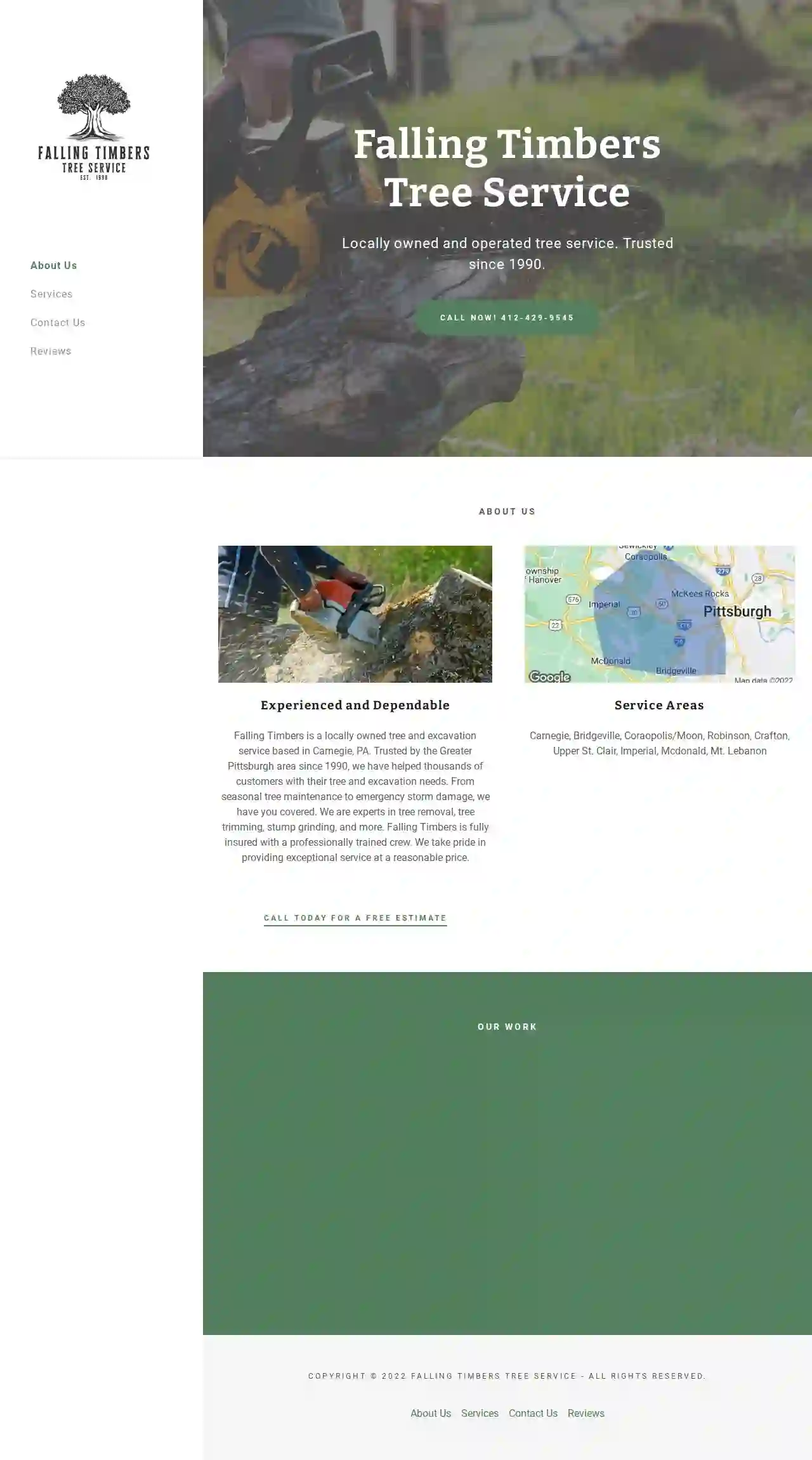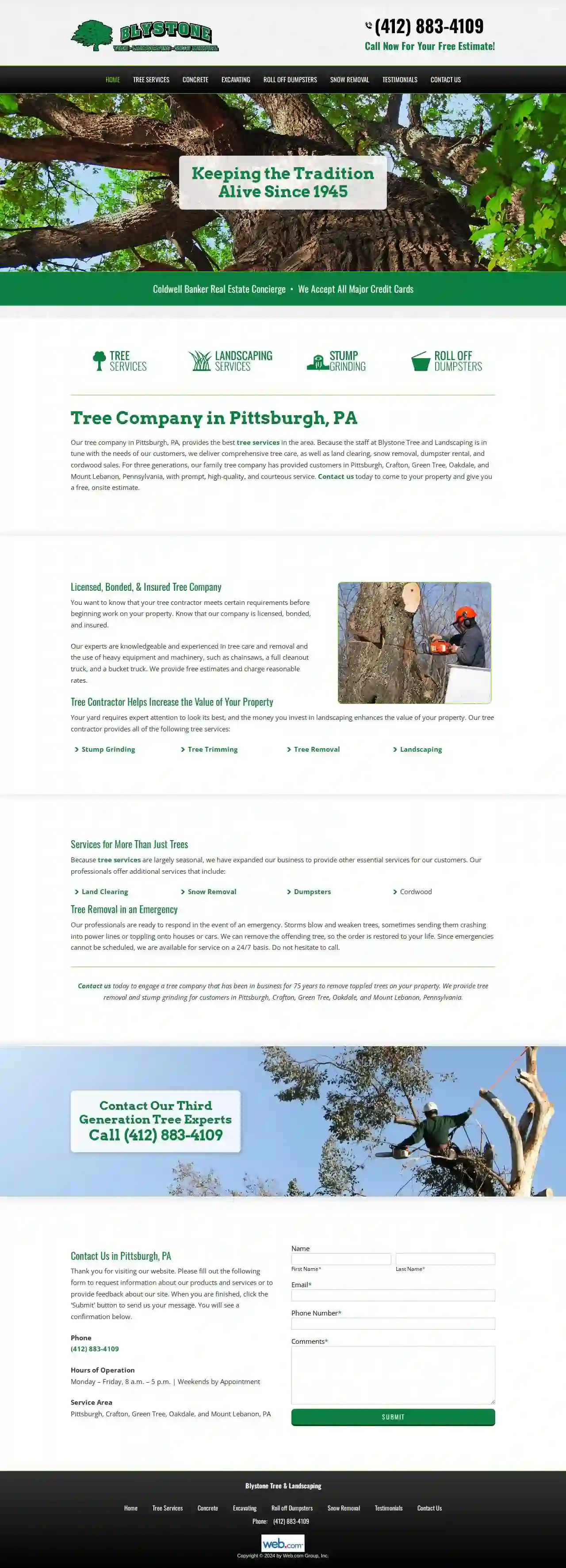Tree Service Spring
Top 10 Tree Service in Spring
Get 3 FREE Tree Care quotes for your project today! Compare profiles, reviews, accreditations, portfolio, etc... and choose the best offer.

Strunk Tree Service, Inc.
3.542 reviewsStroudsburg, PA, 863 Haney Rd, 18360, USStrunk Tree Service is a family-owned, 2nd generation business, headed toward our 3rd generation in service! We offer exceptional services ranging from tree removal to landscaping services. Our team of experts will keep your trees looking healthy and free of bugs. We cover everything from tree trimming to storm damage clean-up.
- Services
- Why Us?
- Accreditations
- Our Team
- Testimonials
- Gallery
Get Quote
Falling Timbers Tree Services
4.69 reviewsCarnegie, PA, 15205, USFalling Timbers is a locally owned tree and excavation service based in Carnegie, PA. Trusted by the Greater Pittsburgh area since 1990, we have helped thousands of customers with their tree and excavation needs. From seasonal tree maintenance to emergency storm damage, we have you covered. We are experts in tree removal, tree trimming, stump grinding, and more. Falling Timbers is fully insured with a professionally trained crew. We take pride in providing exceptional service at a reasonable price.
- Services
- Why Us?
- Testimonials
- Gallery
Get Quote
Blystone Tree and Landscape
448 reviews1234 Tree Lane, Pittsburgh, 15236, USBlystone Tree and Landscaping is a family-owned tree company in Pittsburgh, PA, that has been providing comprehensive tree care and land clearing services for over 75 years. Our team of experts is knowledgeable and experienced in tree care and removal, as well as the use of heavy equipment and machinery. We offer free estimates and charge reasonable rates for our services, which include tree trimming, tree removal, landscaping, land clearing, snow removal, dumpster rental, and cordwood sales. We are licensed, bonded, and insured, and we provide 24/7 emergency services for toppled trees. Our goal is to enhance the value of your property and provide you with prompt, high-quality, and courteous service.
- Services
- Why Us?
- Accreditations
- Our Team
- Testimonials
- Gallery
Get Quote
Stoners Tree Service
4.529 reviewsElizabethtown, PA, 2757 Chestnut Road, 17022, USStoner's Tree Service in Hershey, Pennsylvania, provides prompt home and commercial tree services. As a fully insured, locally owned and operated business, we take pride in offering quality services at affordable rates to Harrisburg, Hershey, Palmyra, and surrounding areas. These services include tree trimming, tree and stump removal, as well as land and lot clearing. We are always happy to answer your questions regarding trees, shrubs, and their safe trimming or removal.
- Services
- Why Us?
- Accreditations
- Our Team
- Testimonials
- Gallery
Get Quote
Penn Line Enterprises, Inc.
3123 reviewsScottdale, Pennsylvania, 300 Scottdale Avenue, 15683, USPenn Line Enterprises, based in Scottdale, Pennsylvania, is a privately owned company that realizes its strength is its people and is relentless in its commitment to recruiting, hiring, and retaining employees of character and encouraging individual accountability at all levels.
- Services
- Why Us?
- Accreditations
- Our Team
- Testimonials
- Gallery
Get Quote
Expert Tree Service Inc
4.633 reviewsWest Deptford, New Jersey, 123 Main St, 08066, USExpert Tree Service has been in business since 1986. We are dedicated to the complete satisfaction of every tree service customer and pride ourselves on offering knowledgeable and friendly tree removal services at competitive rates. Providing quality tree service is our top priority and customer satisfaction is our business. Expert Tree Service is locally owned and operated. Our expertise and quality tree services are widely recognized throughout the Southern new Jersey Area. At Expert Tree Service, we pride ourselves on providing our clients with the best tree care services at fair and reasonable prices.
- Services
- Why Us?
- Accreditations
- Our Team
- Testimonials
- Gallery
Get Quote
Hyperion Tree Service
4.6151 reviews29 Hartford Road, Delran, NJ 08075, 08075, USHyperion Tree Service, Inc. is a professional tree service company based in Delran, NJ. They offer a variety of services including tree removal, pruning, and firewood. Their team is dedicated to providing top-quality service and ensuring customer satisfaction. They are fully licensed and insured, with a focus on safety and efficiency.
- Services
- Why Us?
- Accreditations
- Our Team
Get Quote
Father & Son Tree Service
57 reviewsJefferson Hills, PA, 15236, USGenerations of Experience! At Father and Son Tree Service Plus, Inc., we pride ourselves in having decades of tree service experience in tree removal, stump grinding, tree trimming, and thin-out services in Pittsburgh's South Hills. We operate from a commercial lot full of well-maintained vehicles and equipment. This includes a 'Lift All' bucket truck service, an International dump truck with a hydraulic crane, several chainsaws, hauling tools, log arches, a stump grinder, a wood chipper, multiple pickup trucks, ropes, straps, come-along, and safety tools which are brought to every job site. Continuing a family tradition that began more than 45 years ago, Eckley and his crew have the talent and skill to take care of your residential or commercial tree jobs. We are licensed and insured and have an A+ rating with the Better Business Bureau.
- Services
- Why Us?
- Accreditations
- Our Team
- Testimonials
- Gallery
Get Quote
Upper Darby Tree Service
55 reviewsUpper Darby, PA, 123 Main St, 19082, USUpper Darby Tree Care is a professional tree service company that offers a variety of services including tree removal, tree trimming and pruning, tree fertilization, and tree planting and relocation. Our team of expert arborists understand the unique requirements and problems you face as a result of regional climatic conditions and common tree pests and diseases. We approach tree care holistically, examining your entire property to design proactive and preventative solutions that meet your landscaping needs and goals.
- Services
- Why Us?
- Accreditations
- Our Team
- Testimonials
- Gallery
Get Quote
Tomlinson Bomberger Lawn Care & Pest Control
4.939 reviews3055 Yellow Goose Rd, Lancaster, PA, 17601, USCreating beautiful landscapes and amazing experiences. We understand that each client and every property is different. Our experienced landscapers, arborists, exterminators, and certified lawn care technicians are here to offer solutions that provide the greatest possible results and peace of mind. Your total satisfaction is our #1 priority.
- Services
- Why Us?
- Accreditations
- Our Team
- Testimonials
- Gallery
Get Quote
Over 16,467+ Tree Service Contractors on our platform
Our tree care pros operate in Spring & surroundings!
TreeServiceMatch has curated and vetted the Best Tree Surgeons near Spring. Find the most trustworthy pro today.
Frequently Asked Questions About Tree Services
- Type of service: Tree removal is typically more expensive than trimming or pruning.
- Size and location of the tree: Larger trees or those in difficult-to-access locations will cost more to remove.
- Condition of the tree: Trees that are diseased, damaged, or pose a hazard may require specialized equipment or techniques, increasing the cost.
- Local labor costs: Tree service rates can vary depending on the region and the availability of qualified arborists.
- Tree Protection Zone (TPZ): Establish a designated area around the trees that is off-limits to construction activities. The size of the TPZ depends on the tree's size and species, but generally, it should extend to the drip line (the outermost edge of the tree's canopy).
- Root Protection: Avoid digging, trenching, or compacting the soil within the TPZ. If excavation is necessary, use hand digging or air spading to minimize root disturbance.
- Trunk Protection: Protect tree trunks from damage by wrapping them with protective barriers, such as burlap or plywood.
- Branch Protection: Avoid cutting or damaging branches unless absolutely necessary. If pruning is required, have it done by a certified arborist.
- Watering: Ensure trees receive adequate water during construction, especially if the soil has been disturbed or compacted.
- Monitoring: Regularly monitor trees for signs of stress or damage during and after construction.
- Shallow Soil: In areas with thin or compacted soil, roots may not be able to penetrate deeply and instead grow near the surface.
- Soil Compaction: Heavy foot traffic, construction activities, or vehicles can compact the soil, making it difficult for roots to grow downward.
- Low Oxygen Levels: Roots need oxygen to survive, and in poorly drained or compacted soil, they may grow near the surface to access more oxygen.
- Seeking Nutrients: Roots may grow towards areas with higher nutrient concentrations, which can be near the surface in some cases.
- Tree Species: Some tree species are naturally prone to surface roots, such as maples, willows, and poplars.
- Age: As trees age, their root systems expand, and some roots may naturally grow closer to the surface.
What is the best way to kill a tree stump?
Other methods, like chemical stump killers or burning, can be less effective, time-consuming, and potentially harmful to the environment. Chemical stump killers can also pose a risk to nearby plants or contaminate the soil. Burning stumps is often prohibited due to fire hazards.
Stump grinding is generally the safest, most efficient, and environmentally friendly method for removing tree stumps. TreeServiceMatch can connect you with qualified tree service companies offering stump grinding services in your area.
How much does tree service cost in USA?
What is the best way to protect trees during construction?
Why do tree roots grow above ground?
What is the best way to kill a tree stump?
Other methods, like chemical stump killers or burning, can be less effective, time-consuming, and potentially harmful to the environment. Chemical stump killers can also pose a risk to nearby plants or contaminate the soil. Burning stumps is often prohibited due to fire hazards.
Stump grinding is generally the safest, most efficient, and environmentally friendly method for removing tree stumps. TreeServiceMatch can connect you with qualified tree service companies offering stump grinding services in your area.
How much does tree service cost in USA?
- Type of service: Tree removal is typically more expensive than trimming or pruning.
- Size and location of the tree: Larger trees or those in difficult-to-access locations will cost more to remove.
- Condition of the tree: Trees that are diseased, damaged, or pose a hazard may require specialized equipment or techniques, increasing the cost.
- Local labor costs: Tree service rates can vary depending on the region and the availability of qualified arborists.
What is the best way to protect trees during construction?
- Tree Protection Zone (TPZ): Establish a designated area around the trees that is off-limits to construction activities. The size of the TPZ depends on the tree's size and species, but generally, it should extend to the drip line (the outermost edge of the tree's canopy).
- Root Protection: Avoid digging, trenching, or compacting the soil within the TPZ. If excavation is necessary, use hand digging or air spading to minimize root disturbance.
- Trunk Protection: Protect tree trunks from damage by wrapping them with protective barriers, such as burlap or plywood.
- Branch Protection: Avoid cutting or damaging branches unless absolutely necessary. If pruning is required, have it done by a certified arborist.
- Watering: Ensure trees receive adequate water during construction, especially if the soil has been disturbed or compacted.
- Monitoring: Regularly monitor trees for signs of stress or damage during and after construction.
Why do tree roots grow above ground?
- Shallow Soil: In areas with thin or compacted soil, roots may not be able to penetrate deeply and instead grow near the surface.
- Soil Compaction: Heavy foot traffic, construction activities, or vehicles can compact the soil, making it difficult for roots to grow downward.
- Low Oxygen Levels: Roots need oxygen to survive, and in poorly drained or compacted soil, they may grow near the surface to access more oxygen.
- Seeking Nutrients: Roots may grow towards areas with higher nutrient concentrations, which can be near the surface in some cases.
- Tree Species: Some tree species are naturally prone to surface roots, such as maples, willows, and poplars.
- Age: As trees age, their root systems expand, and some roots may naturally grow closer to the surface.